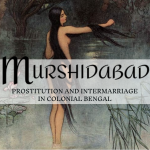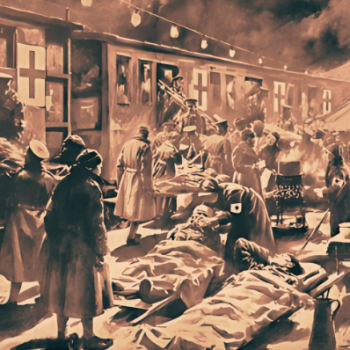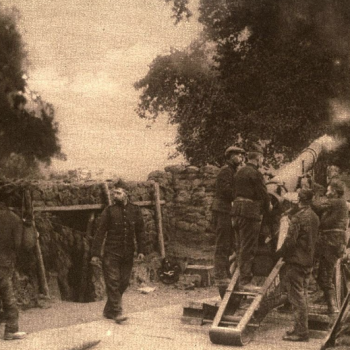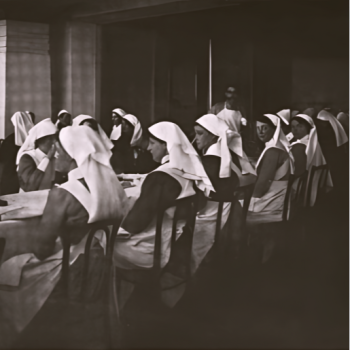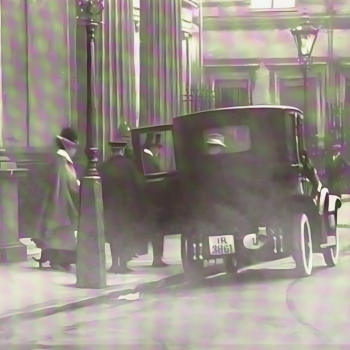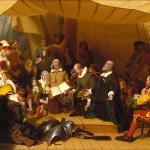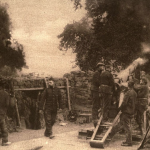THE MURDER OF BUDDUN DAS
Charles Johnston.
Second Week Of May 1889.
Wonderful Mother India! As I made my way through the blazing heat across the parched grass of the square at Berhampore that morning, I fear I did not love you. Yet it was to be a day of romance.
It was in May, midway of the hot season.
My shoulders and back were stinging with prickly heat, my ankles were swollen with mosquito bites. Altogether a morning of exasperation.
It was hot: so hot that the red desert wind singed my nostrils, so hot tables warped, cracking in the like pistol-shots; so hot that the trees fringing the square hung their and quivered in the glare; the minas sat in the grass, open-beaked and gasping. Only tiny blue butterflies fluttered everlastingly.[1]
From the white, outer blaze I stumbled into the warm cavern of the huge Court building where ineffectual punkahs were flapping and creaking in every breathless room, my eyes full of green circles of light from the outer glare. I entered my own court-room on the ground-floor, laid aside my huge helmet of reed-pith, sat myself down with a sigh of relief in my cane-seated office-chair, mopped my face with a handkerchief already wet, and bade the grizzled punkah-wala pull harder, to stir the hot, acrid air, smelling of Indian bodies in Indian heat. After a long breath or two, I found free energy for a look round the dingy court-room, and immediately perceived that there was something in the wind.
Holding themselves a little apart from the dusky, patient crowd at the back of the court-room were three exceedingly pretty, young women, hardly more than girls, bright with gold bracelets and earrings, and gracefully draped in white muslin saris broadly margined with red; they were smiling, dainty, vivacious with brown skin no darker than cinnamon, and one could see that they were the target of the eager and slightly scandalized observation of the dingy village folk.
The first case on the file was a charge of murder. I ordered the red-turbaned policemen, with jackets of indigo and stiff leather belts that galled their unaccustomed loins, to bring the prisoner in. The file announced that he was Mozuffer Khan, son of Mahmud Khan, of Koli village, cultivator. As he stood there in the railed dock at the right corner of my table, he did not look like a murderer. He was too jaunty, not tense enough, too well-pleased with himself for that. A shock-headed fellow with a black beard and a rakish eye, wearing a dingy breech-cloth, and with a dingy strip of muslin over his shoulders; a sturdy rascal, Mozuffer Khan, with big arms and hairy shanks, but not murderous-looking; barefooted too, which has its advantage in a court of justice.
The dusky folk of Lower Bengal make imaginative witnesses. The inspiration comes upon them suddenly, carrying them away before they real before they realize it. They take some simple fact, some common situation, bathe it in Indian light and drape it about with Oriental trappings, laying on splashes of gaudy color and startling ornament; piling splendor on splendor. Relevancy is no great matter. It is the story for the story’s sake.
When I was quite new to it, I sometimes tried to record these purple patches, wrestling with florid, unfamiliar phrases like some old lady inquiring her way in a foreign village. Once or twice I went so far as to institute proceedings for perjury. But Ritchie only laughed in his big, sympathetic way, and said, “Never mind them! They are not telling lies; they are composing poetry! It comes over them, and they cannot help it!” So I came to lay down my quill, giving myself over to the pleasure of listening and watching the poet’s toes.
When he slips his cable and pushes off from the wharf of fact, to sail forth into enchanted waters, his toes, hither to quiescent, begin to work. They knot themselves, weave in little circles in the air, cramp together, spread out again, and suddenly shut like a fan. The poetic witness rules his face, uttering his wild inventions with sad and downcast visage, as who testifies unwillingly, but truth must out; he controls his eyes, in no fine frenzy rolling; he governs his hands. But he never thinks of his toes. Wherefore the Assistant Magistrate looketh pensively downward, and cheweth the feather of his quill pen. He is watching the rhythmic movement of the toes, sensitively responding to the strain on the subliminal mind.
The Great Charter promised that justice should be delayed to no man, yet here am I heartlessly keeping Mozuffer Khan, son of Mahmud Khan, Koli village, cultivator, standing in the dock, in jeopardy of his life, while I ruminate on toes. Yet, as he is thoroughly enjoying his conspicuousness, I need make myself no reproach, although I may wonder what is in the back of his mind. He looks too confident for a murderer, too rakish, too light-minded; though I shall not be surprised to see him turn up someday as the victim. He must get on people’s nerves.
The Court Sub Inspector, Bannerji by name—Nobin Kishto Bannerji, to give him his full style and title—is a suave high-caste Brahmin, whom I like. He steers the prosecution, calling village folk to bear witness to finding the mortal remnant of one Buddun Das in a thicket of bamboos in the cool of the morning after the new moon of the fourth month. They had reported the matter straightway to the police sergeant of the nearest thana. Other witnesses seek to implicate Mozuffer Khan the debonair, weaving chains of circumstance about him, hinting causes of quarrel, even suggesting the woman in the case. Evidently unpopular, Mozuffer Khan, son of Mahmud Khan, of Koli village, cultivator; but I cannot hang him for that. He stands there in the dock, serene, unruffled, unafraid, with his cock-of-the-village air, smirking at the world and at justice. So the prosecution rests its case.
Comes the turn of the defense. The first witness is a woman married, a Muhammedan. She enters the witness box on my left, at the other corner of my table, and I notice that the three fair dames with red-bordered saris and gold ornaments whisper as they look at her and giggle decorously. They have followed the whole case with such absorbed interest and curiosity that I decide within myself that they can have no part in it. By this time, our witness is sworn. She announces herself to be Motiya, the Pearl, wife of Hussein Baksh, of the village of Bel Gaon. Comely enough, too, in her countrified way, with dark hair sleek with coconut oil, dark skin, and big, dark eyes; clad in a dingy sari narrowly bordered with brown; barefoot, like all Indian women, in sign of age-long servitude.
The Pearl waits patiently to be questioned, her clasped hands resting on the rail of the witness-box. Wonderful, these selfless Oriental women, who nevertheless in their subjection wield so much power. The Pearl, for example, seems to have made her influence felt in more ways than one.
I ask her whether she knows Mozuffer Khan, son of Mahmud Khan, of Koli village, cultivator, the prisoner at the bar. She nods, and says she does; declares, in fact, that she knows him extremely well. How could she fail of knowing him, since he has been making violent love to her for two years now, pursuing her with amorous guile? Has he not followed her in the pasture when she has gone to gather fuel in the wake of the herds? Has he not waited for her under the wide peepul tree at “cow-dust-time,” when she drove her little fawn-colored kine along the road, and the evening air—though she does not say so—was full of shimmering dust of gold in the slant rays of the swift-sinking sun? Has he not watched when she went to the village bazar for curry, vegetables, or water-jars of fine red clay, or a new muslin sari at the dokan by the village cross-road? Has he not waylaid her in the dawn and in the dusk, in all ways seeking to allure her into the primrose pathway to the big, wide gate? These are not her words, but she is very downright about the fact.
Had she told her husband, Hussein Baksh? No, of course not. Why should she tell him? What could come of that but strife, perhaps bloodshed? No, she had told no one. Is not four-eared counsel the best?
But to return to Buddun Das, the central figure in all this coil, the one person in the case who had no word to say, the “deceased,” as my friend the Court Sub-Inspector unctuously called him. His outworn casket had, as we saw, been found curled up in a bamboo clump in the chill of the morning. For reasons stark in their realism, conclusive in that hot time, those who retrieved him knew that he was not long dead. The vultures, indeed, had as yet taken slight interest in him. Further, it had been made clear that the said clump of bamboos was on the north side of Koli village, therefore five miles or more from the home of Motiya in the village of Belgaon—which is which is the settlement of the “Bel trees.”[2]
This being elicited, I asked the still, quiet-voiced woman, who so frankly avowed her wooer and depicted his wooing, whether she could remember exactly when she had seen the prisoner Mozuffer Khan, of Koli village, cultivator, before she heard of the killing of Buddun Das. Yes, she nodded confidently: she remembered perfectly. She saw him on the night before the murder, the night of the new moon of the fourth month, some two hours after sunset. She was sure of the day, because her lawful lord, Hussein Baksh, was away from home; had, in fact, journeyed to Kasimbazar, driving a bullock wagon, with a load of rice-straw for the Nawab Bahadur’s elephant stable; she had cautioned him to start early, as the night would be dark. These folk who keep lunar festivals always know just what the fickle luminary is doing.
Having thus defined the time, two hours after sunset on the night of the new moon, would she tell us the place where she had seen the prisoner, Mozuffer Khan, of Koli village. Yes, she would. She saw him at her own house in the dark of the evening, her husband being then away in Kasimbazar. The prisoner, Mozuffer Khan, had come, in fact, because he knew her husband would be away; had come to make love to her. So she bore testimony, and stood there quietly waiting for further questions, her folded hands just resting on the rail of the witness-box.
I wrote down what she had said on sheets of white foolscap with the white embossed arms of the Government of India at the top. Then I laid down my quill, sat back in my chair, and looked long at that Muslim wife so quietly and irretrievably damning herself, as it seemed, by confession of infidelity. Her husband was there in court, and all her circle; yet she was unperturbed. Among the fair dames in the corner there was a faint titter and stir of excited expectancy, instantly hushed by Eastern decorum; but the woman’s own friends were apathetic and still.
So I curiously scrutinized this modern Helen of Belgaon, thus, in the very presence of Menelaus, acknowledging with serene brow and tranquil speech the coming of her Paris. Then I looked at Paris, that is to say, Mozuffer Khan, of Koli village, cultivator. His whole being crowned with self-satisfaction, every ounce of conceit in the male carcass of him jubilant at the publication of his gallantries; he rubbed his hands together, his right foot caressing his hairy left shank as he listened to this comely woman thus risking all, as it seemed, name and fame and friends and future, for dear love of him. By the way, though it was in no wise relevant to the case, Mozuffer Khan of Koli village had also a wife of his own.
From the jubilant Paris of Koli I looked back, still wondering at his Helen, regarding me with frank, innocent eyes. Then, as it happened, she turned toward Mozuffer Khan, as he stood there in the dock facing her at the other corner of my writing. Her face lit up. Did her eyes say, as I might well have expected, “I am my beloved’s, and my beloved is mine?” To my boundless surprise, they said nothing of the kind, but rather something like this: “Scum of the earth of ancestry Darwinian, if I ever get a chance, I’ll carve your liver!”
A sentiment and expression sufficiently startling. I picked up my quill again, dipped it meditatively into the ink-bottle, straightened my sheets of foolscap, and asked another question. The fair ladies at the back of the court held their breath, their eyes grew with expectancy.
She had seen Mozuffer Khan, the prisoner, on the night of the murder of Buddun Das, two hours after sunset at her own house, her husband Baksh being then absent at Kasimbazar? She nodded confident assent. Those were the facts and circumstance.
Then I had to venture on delicate ground. But an Assistant Magistrate must brave the matter. Would the witness tell the Court exactly what then taken place? What had he done? And what had she done? As I asked the question, I avoided looking in direction of Hussein Baksh.
Very frankly she gave her astonishing answer. Yes, she would tell whole matter in detail. First, as to what Mozuffer Khan had done, there at her house, at evening. He had up noiselessly in the dark, his bare feet contributing to that noiselessness; had proceeded to lay hold of the sliding-mat door and push it open; had then thrust in his head and shoulders, asked her in a low voice whether she was there and alone. That is what he had done.
Then as to what she had done. At first, when the door began to move, she was frightened, thinking it was a robber. But when she heard the voice of Mozuffer Khan, of Koli village, and recognized him, she at once ceased to be afraid. She prepared, indeed, in a singular way, to receive him. Rising from her bed, and going to the shelf beneath the thatch, she laid hold of a hashua, which is a short-handled bill-hook for chopping sugar-cane; approaching the door and Mozuffer Khan, and with her left hand seizing him firmly by his shock of hair, to get a purchase on him, she had smitten him bravely on the neck with her hashua; whereat he had yelled horribly, withdrawing his head, and disappearing into the darkness. Thereupon she had pulled the mat-door back into place, and returning to her couch, had lain down and gone to sleep. On the next morning, seeing some blood on the hashua, she had scoured it clean with sand and water. When her husband had returned, later in the day, he had told her of the murder of Buddun Das, already beginning to be the news along the roads, and as far as neighboring villages. That was all she knew about the case. So she smiled, and held her peace—with clasped hands awaiting her dismissal.
Truly, a startling alibi; but she was visibly frank and truthful. Even an Assistant Magistrate, fresh from college lecture-rooms, must learn to distinguish between prose and poetry. So I let her go. Whereupon she peacefully rejoined her husband, who was evidently proud of his wife, so far as a Mussulman may be without condescension; and, in truth, well he might be. Then, turning to the prisoner, Mozuffer Khan of Koli village, I once more laid down my quill and looked him over.
He was smirking delightedly, evidently fancying himself unboundedly as a devil of a fellow and nodding corroboration of Motiya’s wonderful narrative. No need to ask him if he admitted her charge. He exulted in it.
Then I considered. If Motiya had, as she said, held him by the hair with her left hand, while she struck at him with her stubby billhook, she must have hit him on the left shoulder, at present hidden by his muslin scarf. I got him to come over toward me, stood up, drew the muslin cloth aside, and, sure enough, on his shoulder there was a long, irregular streak, bluish against his brown skin; just such a scar as a hashua would make, thus held and thus valiantly wielded. Corroborative evidence of the first class, the more so because neither he nor Motiya had thought of it.
Yet it is well to go softly. Even an Assistant Magistrate learns that a scar may come in more ways than one. So, as the Crow said, in the story of the Mouse Hiranyaka, let the matter be examined further. Ordering Mozuffer Khan of Koli village to turn his back toward me, I took a long pencil, and began to touch him lightly here and there on the left shoulder, gradually working nearer to the scar. He had no inkling of what I was doing, or why I was doing it, until I pressed the pencil point lightly on the scar itself. Then he very genuinely winced and shrank away.
That may seem a very superfluous procedure. Yet I have had good Bengalis come to Court with terrible wounds, generally on their defenseless backs; and, though the tragical marks may have been on the right side, they have unmistakably winced, and even shrieked out, when I pressed a corresponding spot on the left. Scars of that kind yield to soap and water. Then one makes trouble for their artistic, but forgetful owner. But the scar on the shoulder of Mozuffer Khan held good. The alibi stood its ground.
Fated to be quaintly corroborated too, that unprecedented yet veridical tale. For the Court clerk, a Brahmin gentleman at forty rupees a month, and my esteemed friend, announced that the next witness was a Sahib, and straightway proceeded to fish out a chair for him from a neighboring room. He came, too, that gentleman of Europe, and had I stared and rubbed my eyes when I beheld him. I might well have been pardoned. For in nothing save, perhaps, a shade of color, was he distinguished from any well-to-do Hindu villager: the same dhoti and gamcha—breech-cloth and shoulder-cloth—the same bare shanks and sockless shoes, the same shock of hair, even the same, green-lined cotton umbrella, a shield against tropical moonstroke.
I spoke to that Sahib in English, and began to administer the oath to him in what I supposed our common tongue. But he shyly excused himself, telling me in fluent Bengali that his English was rusty for lack of use, and asking permission to testify in the local vernacular. I bade him go ahead, and offered him the chair good Sharada Babu had brought; the which, somewhat embarrassed, he took.
Pathetic derelict in the vast sea of Indian life, human flotsam on that wide, dark tide, were you a deserter or an exile from your own people? I wondered then, I wonder still, what your history was; what romance, what scandal, first motived your exile. You gave me some name like Surenne, so you were, perhaps, a silk factor, or one of the colony at Chandranagar. Yet I have a suspicion that, as you gave me your name, your toes were gesticulating their protest. I wish I had asked you to remove your shoes. I had the right to question you with the law’s rude directness. But I refrained. Your story is your own, your romance or scandal. So go back to your brown village folk of Belgaon and forget, day by day, the fretted, feverish race came from; learn, unless, as I think, you have learned already, to smoke the placid hookah and chew red areca nut wrapped in green pepper leaf smeared with lime, plugging cheek with pan-sipari like your neighbors of Belgaon. Dream yourself the large quietude of rural India; forget and be at rest.
But for the present, Surenne Sahib is no John-o’-dreams. His errand is mere prose. For it appears that it was to Surenne Sahib’s kuti that Mozuffer Khan betook himself like a stricken deer, gripping his wounded shoulder and bemoaning the waywardness of womankind; Surenne Sahib had taken him in, washing away the gore, smearing him with ointment, and tying him up in bandages; whereupon the gay Lothario of Koli village had fallen asleep much comforted, and snored the night away.
Having thus fortified the alibi, already strong, Surenne Sahib bowed himself out of Court; turned his back, perhaps for the last time, on the things and people of his race, and the immemorial brown waves closed round him.
So I prepared to release the rascal from the charge of murder; yet I had a surprise in store for him: something that had never occurred to his joyful mind. Never, indeed, have I seen man more taken aback than he was, when I told him that, though he was freed from the capital charge—here he made a glad motion to depart—I intended to hold him for lurking trespass, and try him in the afternoon. The which I did, and, mainly on the evidence of the Pearl, found him guilty, and locked him up for a month with hard labor. Such was his Fall of Troy.
The day’s romance was not yet done. At the rear of the Courtroom, where stood the three good-looking girls with broad-margined saris, the course of the village drama had been followed by politely restrained mirth and decorous giggles. It was time for the two sides to change places; the village folk were now to become admiring auditors, while the town folk, with the prettiest of the prettiest of the Bengali Graces as protagonist, unrolled their tragi-comedy…[3]
← Table Of Contents →
SOURCES:
[1] The hot season of Murshidabad was usually not too different from the rest of Lower Bengal, with the exception being the occasional visit from “the burning winds” of Central India. The third week of May, 1889, was an uncomfortable anomaly. The temperatures had reached over a hundred degrees in Murshidabad. At the same time a wind of an “irregular cyclonic circulation,” developed in the center of Berhampore. This combination of heat and wind ultimately lead to a serious fire on May 12, 1889, “a calamity,” which the municipality had no means to combat. The fire burned everything in its track, destroying four hundred homes at an estimated loss of Rs. 25,000. The flames were only extinguished when it reached a stretch of mango plantations. [“Indian Daily Weather Report.” Civil & Military Gazette. (Lahore, Pakistan) May 7, 1889; “Fire At Moorshedabad.” Civil & Military Gazette. (Lahore, Pakistan) May 22, 1889; Hunter, W. W. The Imperial Gazetteer Of India Vol. X. Trübner & Co. London, England (1886): 30.]
[2] Johnston, Charles. “Helping To Govern India: Kandi Subdivision.” The Atlantic Monthly. Vol. CIX, No. 2. (February 1912): 265-273.
[3] Johnston, Charles. “Helping To Govern India.” The Atlantic Monthly Vol. 108, No. 5. (November 1911): 643-652.



